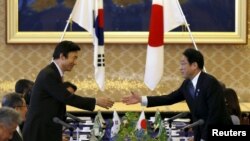As they mark the 50th anniversary of the normalization of diplomatic ties, there are signs of a thaw between two U.S. allies Japan and South Korea.
Relations between the two East Asian neighbors have been stressed over the years by Tokyo’s attitudes toward its wartime past. Many Koreans believe Japan has not fully apologized for atrocities committed during World War II.
Japanese Prime Minister Shinzo Abe attended an event on Monday hosted by the South Korean Embassy in Tokyo to celebrate the historic 1965 treaty normalizing relations between Tokyo and Seoul.
At the reception he said he wants to begin a new era of friendship with South Korea.
“Cooperation between the two countries for regional and global issues, along with international cooperation will lead to the establishment of a new relationship,” Abe said.
South Korean President Park Geun-hye attended a similar event in Seoul hosted by the Japanese Embassy. She read a statement that her Foreign Minister Yun Byung-se, who was in Japan for the anniversary, also read to the gathering in Tokyo.
“It is important to put down the heavy burden of past history with a heart of reconciliation and co-prosperity,” President Park said.
Since the end of World War Two both Northeast Asian powers have developed into stable democracies, advanced economies and are stalwart allies of the United States.
Both cooperate on trade and on regional securities issues, especially the common threat of a nuclear North Korean state.
But relations between South Korea and Japan have grown increasingly tense over unresolved historical grievances and concerns that Japan is trying to down play past war crimes.
Wartime controversy
Since she took office in 2013 President Park has refused to meet with Abe until he offers a sincere apology for past wartime abuse, and makes amends to the thousands of women known as comfort women, who were forced into prostitution to work in military brothels from the beginning of Japan’s colonial rule in the early 1900s until the end of World War II.
Abe has so far refused to apologize but he has said he will uphold statements by past leaders that offered apologies for Japanese misconduct during the war.
In a landmark 1993 statement Japan acknowledged that its military coerced women into prostitution and offered an apology to them.
Tokyo also maintains that the 1965 normalization treaty, in which Japan agreed to pay South Korea $800 million in grants or loans settled all compensation issues.
But the Japanese prime minister also stirred the controversy when he visited a World War II shrine that includes some Japanese war criminals. And Japanese nationalists have suggested that not all the women were forced into prostitution.
Abe is expected to address this issue in a speech he will deliver in August on the 70th anniversary of the end of World War II.
Possible agreement
President Park however recently said in an interview that a resolution with Japan over these historical issues might be close at hand.
After South Korean Foreign Minister Yun Byung-se met with his Japanese counterpart Fumio Kishida the two agreed there would be a summit "at an appropriate time.”
There is speculation that it could happen on the sidelines of three-way summit with China by the end of this year. The two also agreed to hold foreign ministerial talks on a regular basis, and to visit each other's country.
“We hope to expand our mutual cooperation by strengthening the sprit of trust and friendship, and to strengthen dialogue for regional and global issues,” Yun said.
The two foreign ministers also agreed to work together to resolve their differences over Japan’s request to add 23 historic sites to UNESCO’s World Heritage List.
These include coalmines, steel works and shipyards that exemplify how Japan became the first Asian nation to enter the modern industrial age from 1850 to 1910.
South Korea and China objected to Japan’s bid saying that it purposely distorts history after 1910, by ignoring the systematic human rights abuses that occurred at some of these sites during Japan’s military occupation and colonial rule over much of Asia.
A recent poll among South Koreans show majority support for improving relations with Japan even if Prime Minister Abe does not make any further apologies.
Doubts remain
Kim Jiyoon, a research fellow with the Asan Institute for Policy Studies that conducted the survey, says most South Koreans don’t believe the historical differences can be resolved.
“They do not really believe that Japan or Prime Minister Abe would apologize and that anything can be really done to resolve the history issue," Kim said. "So it is very practical to go for the summit and express our concerns and also continue a dialogue to curb any further damage in the relationship between Korea and Japan."
But some vocal minorities are not willing will to let past grievances go.
On Monday descendants of Koreans who were forced to serve in the Japanese imperial army or work for Japan's colonial government protested in front of the Japanese Embassy in Seoul, demanding compensation and recognition.
And in Tokyo, Japanese right-wing activists demonstrated in front of the Korea Center amid heavy policing, shouting slogans such as "Cut ties with South Korea".
Japan and South Korea are also at odds over ownership of the sparsely-populated Dokdo islets, which sit in the Sea of Japan (East Sea) and are controlled by Seoul. Tokyo claims them under the name Takeshima.
VOA Seoul Producer Youmi Kim contributed to this report.











